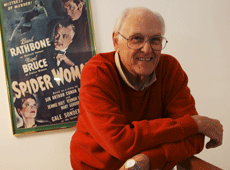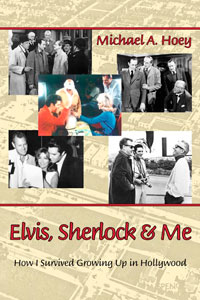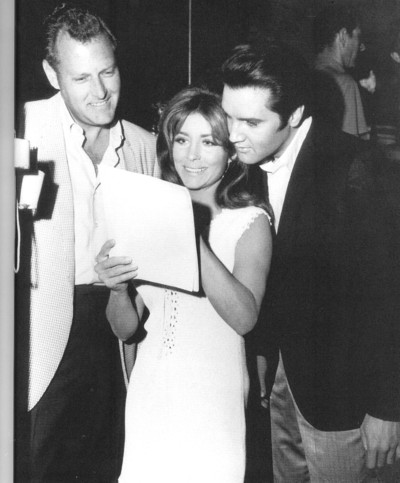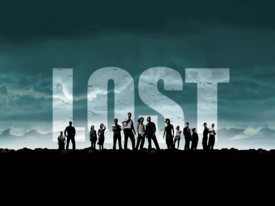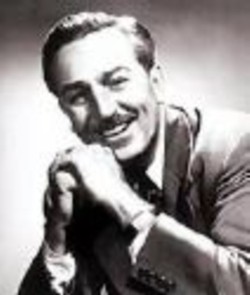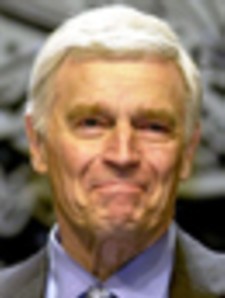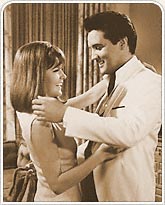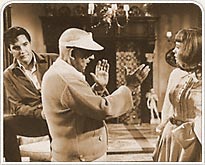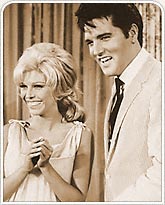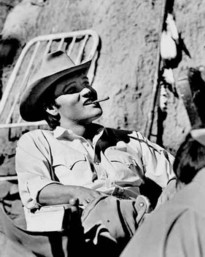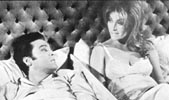 |
 |

Michael is an award winning film editor, recognised by the Writer's Guild of America, and received several Emmy Award nominations for his work on the hit TV show, Fame. Last year Michael's memoir, Elvis, Sherlock & Me was published. A fascinating account of Hollywood behind the scenes, the studios, the stars, television, and of course Elvis, it is one of those books you just can't put down! In an equally fascinating interview, Michael talks to EIN's Nigel Patterson about not only working with Elvis and moves to change The King's acting direction, but the Golden Age of Hollywood, the studio bosses, the stars, the early days of Las Vegas, and the state of film and TV today.
EIN: Michael, thank you for taking the time to talk with us today. MH: My pleasure. MH: Speaking in a general sense I would have to say my six films with Elvis were a definite highlight. Also, my six years working on the TV show, Fame, was another highlight. I seem to have my best times on musicals. EIN: Why do you think you have such an affinity with musicals? MH: I grew up in a musical environment. My father was a professional singer and even when he didn't sing professionally anymore he would still warm up at the piano in our home. He used to say that doing the scales was good for his diaphragm. I also grew up on studio lots around musicals. I have very fond memories of classic films like An American In Paris, Singing In The Rain and Seven Brides for Seven Brothers. I was, and still am, a huge fan of the Gene Kelly, Fred Astaire-Ginger Rogers and Nelson Eddy and Jeanette McDonald movies. Interestingly, I also had a fair voice and while in high school I joined the Boys Choir. Later I was part of a group called The Harmonaires. Our bass player was Robert Blake who would later enjoy fame as an actor on the hit show Baretta. EIN: In recent years, Robert Blake's life has taken a turn for the worse. MH: It is sad how his life has ended up. Robert's personality certainly changed once he became a star. The death of his wife is still unresolved. I always believed he was innocent. I never believed he could be that stupid as to kill her in the way the police suggested. The jury agreed and acquitted him of her murder. Robert was always famous for his temper so I guess you never know if it got the better of him. But as I say, I believe he is innocent.
By my early 20's our relationship ruptured. Dad did not approve of my upcoming marriage. During a phone call unfortunate things were said between us. We didn't talk then for about 6 or 7 years until my son was born. I named him after my father. I sent Dad a telegram to tell him of the birth and literally within 20 minutes he sent a return telegram saying he would be there in 2 days. It was then we were able to make amends.
Subsequently I wrote a screenplay with a World War II plot. In it I tried to tell the story from both the American and German sides. My Dad couldn't understand why I was glorifying the Nazi's. I found this amusing as he had played a Nazi in a number of WW2 films and besides, I wasn’t glorifying the Nazi’s, merely telling a story. Anyway, Dad took my screenplay to Herb Meadow and I received very positive feedback. It was then I knewI could write for Hollywood. Sadly, my Dad died about a year after we made amends. EIN: And your relationship with your mother? MH: I was very close to my mother. She was a wonderful lady and I loved her very much, as did my first wife and three children. She managed to bridge the gap between me and Dad. After my parents divorced I was sent to boarding school. After that I lived with my mother for a while in California. EIN: Michael, the Golden Age of Hollywood. What was it like being part of that glorious time? MH: It was a marvelous time. The studio bosses really loved films and wanted them to be as good as possible.There was a distinction between "A" and "B" movies but many of the "B" movies, despite being made on a small budget, were quite wonderful, both technically and artistically. The Sherlock Holmes films are a good example. By the 1950s the studios were getting rid of their contract players but it was still a lot of fun. Today, it is all about $$$ and due dates. There is a lack of interest in the art of films. Movies are made of old TV shows and game shows, and creativity seems to have lost its way. Where as in the Golden Age, directors such as the wonderful Roy William Neil and Alfred Hitchcock would create moods, today it is simply 'by the numbers'. If a film is moderately successful the studios commission sequels 2, 3 and 4 without regard to the artistry of film making. As a result the great fun that was there in the 1940s and 1950s has gone. EIN: The Hollywood films of today compared to yesteryear. What are your thoughts? MH: The studios rarely take chances today. This means that most films are very similar and lack creativity. There is usually very little character development. The result is mindless big budget action films like Transformers or repetitive and inane teen comedies. Today it is not about artistic creativity it is about how much bang you can get from your special effects guru. There are still some great films though. For example I very much admire George Clooney's recent film, Michael Clayton, and the Johnny Depp film, Sweeney Todd, is also very good.
MH: You are right. As a child growing up Vegas was only a small town. The Strip hardly existed. The Old Frontier was the only hotel on the Strip; the Flamingo was being constructed. There were not the flashy bright lights synonymous with Vegas today. Las Vegas in those days was centered on the downtown area, with fancy hotels with supper clubs similar to Ciro’s, Mocambo and the Trocadero that were popular in Hollywood at that time. I remember as a young boy of 12 or 13 riding around Vegas in an open sided bus. There was desert for as far as you can could see. I would also go horseback riding by myself in the desert. You couldn't do that today. Today Vegas has grown exponentially. It is really built up like New York. You can't see the sun for the highrises and unless you are on the outskirts of the city you won't see any desert. EIN: Did you ever see Elvis performing in Vegas, and if you did, what was your impression? MH: Only in the documentaries that were filmed. I have a very intense memory of watching a scene in the final documentary, Elvis on Tour, where Elvis was standing backstage waiting to go on. This was filmed just a few months before he died and he looked absolutely awful. He was immense, and the sweat was pouring down his face, but what really got to me were his eyes. They were absolutely lifeless. This was not the Elvis I’d known and worked with. It was so sad.
Michael Hoey, Michele Carey & Elvis on the set of the sex farce, Live A Little, Love A Little
EIN: What was it that motivated you to become involved in Hollywood? MH: As a child of 9 or 10 I remember the first time I watched the wonderful director, Roy William Neil on one of the Sherlock Holmes films. The way he was able to crerate atmosphere and mood in a film was marvelous. I went straight home and with a friend we recreated the studio in our garage. From that day on I was totally committed. EIN: You started out as an apprentice editor before moving on to the producing. How did this all come about? MH: I was very fortunate to learn my trade under some great people and in some great studios. I worked with the likes of Jack Warner, Darryl Zanuck, Fred Zimmerman, John Ford and George Cukor. And I worked at the major studios - MGM, Disney, Warner Bros.When I first started out I operated a splicing machine with my hands and feet. It was very repetitive, doing the same thing over and over again; a bit like that marvelous routine that Charlie Chaplin did in Modern Times. I actually became a producer before I became a fully fledged Editor. It is an interesting story. I was working on a controversial film, The Chapman Report, based on the Kinsey Report into sexual mores of Americans. It starred Efrem Zimbalist Jr., Jane Fonda, English actresses Claire Bloom, and Glynis Johns and Shelley Winters. For 1962 it was very controversial, dealing with some very touchy subjects. We were presenting things like "How often do you have an orgasm?" and a scene where Claire Bloom's character is gang raped. The Shurlock Office, which is now called the Motion Picture Association of America and is authorized to rate all motion pictures, found a lot of objectionable things in the film. On top of that, the Legion of Decency, which was the Catholic censor board, hated just about everything in the film, particularly the ending and wanted the studio to change it. At a screening for studio boss Jack Warner, he became quite upset about the idea of having to shoot a new ending. The screening had proceeded with a small number present stopping to discuss each scene. As I had only been involved in editing I pretty much kept quiet until Jack Warner became upset. I said, "Mr Warner, do you mind if I say something?" He replied, "Go ahead kid, everybody else has." I said that if we changed the ending as proposed we would destroy key elements in the film and I suggested we could get around that by using a portion of a scene that had been deleted and then filming a short scene between two characters that would discuss the issue that bothered the Legion of Decency. I spoke up because both Richard Zanuck, the producer, and Geoge Cukor, the director, were not present at the meeting and I wanted to defend them in their absence. Jack Warner sent me up to his office to write the scene I had suggested. I found out later that after I left the screening he said to those present, "That kid's pretty sharp, I think I'm going to make him a producer." So that's how I became a producer. My actual progression in the industry was Appentice Editor; Producer; Editor, Director, Script Writer. EIN: Of all the roles you have had, editing, writing, producing and directing, what is your preference? MH: I always wanted to be a director so I have to say directing. My primary goal when I started work in Hollywood was to write and direct and I have been very fortunate that I have been able to do both and be successful at them. My initial grounding in the industry in editing has been of great help to me in achieving my goal. It allowed me to know what a director needs to know when he goes on to a set.
EIN: Where have you done most of your directing, on film or TV? MH: Most of my directing experience is television related. I have directed two feature films but it is on TV that I've found most success in this field. I have directed a number of major programs including Fame, Dallas, Falcon Crest and Murder She Wrote. On the production side, I am proud of my work as Executive Producer of several Emmy Awards presentations and Fame.
A funny story involving Bob that's not in my book. My father was co-starring in one of Bob's films. In one scene my dad had to babysit Bob and take him back to a country where he would become King. In the scene they were playing gin rummy. Through a window you could see an assassin with a knife. Well Bob and my dad changed seats and my dad gets the knife in his back. Well they continued to play cards for 10 minutes and Bob didn't realize he was playing cards with a "dead man". My dad was walking around with a prop knife stuck in his back. It was very funny to watch.
EIN: John Wayne? MH: I only met John Wayne once, briefly. It was during filming of Wake of the Red Witch. I found him to be friendly but I didn't get to know him well. He was tough hombre. as was director John Ford. I was always a big fan of "The Duke" and loved watching the westerns he made with John Ford. I did become good friends with one of John Wayne's sons, Michael. Michael is a great guy. EIN: In your book you write very fondly about Jane Wyman. MH: What a lady Jane was! For 11 years she played an absolute bitch on Falcon Crest, yet in real life she was one of the nicest people you could ever meet. She was a total professional; always the first on the set to do the job!
EIN: And of course we need to talk about your time working with Elvis. What were your initial thoughts about him? MH: My first involvement with Elvis was working on Tickle Me. Director Norman Taurog brought me in to do ideas and script re-writes if necessary. The original script was written by Edward Berns and Elwood Ullman. They were well known slapstick writers and had been responsible for many of The Three Stooges comedies and the Bowery Boys films. I first saw Elvis in the wardrobe room at Paramount Studios. Tickle Me was being made by Allied Artists but we used the Paramount lot. Initially I thought Elvis was a bit aloof, a bit stuck up. I realised soon after though that in fact he was just very shy. I also realized this was why he had the need for his pals, the Memphis Mafia, to be around. They provided companionship and he felt comfortable with them. I got to know most of the boys and in fact Sonny and Red West both appeared in a science fiction film that I wrote and directed. EIN: Tickle Me is often criticised as a film. What are your thoughts on it? MH: I have always thought the film had its moments. It was made on one of the least expensive budgets for an Elvis film. Colonel Parker had made a deal that in order to save on costs, he would provide unreleased studio songs previously recorded by Elvis. That meant there was only licensing costs for the music. It was a pretty damn good idea. Tickle Me had a good music soundtrack and it also had its narrative moments. There were genuine moments of humor and fun. However, the plot was rather feeble although it satisfied the objective of surrounding Elvis with a bevy of beautiful women and having him sing a bunch of songs. I re-wrote the final scene in the deserted hotel using as a basis a series of haunted house gags inspired by the wonderful Bob Hope comedies, The Cat and the Canary and The Ghost Breakers. With the exception of some second unit material we never left the Paramount lot! The film worked though and turned out to be the third highest grossing film in Allied Artist's history. EIN: Why are Elvis' films, as a whole, so maligned? MH: That is a good question. Elvis' body of film work does appear to have received greater criticism than the works of say Bob Hope and Martin & Lewis. Yet, quality wise, it is right up there with them. Many of Elvis' films were well produced and directed. His earlier films in the 1950s were certainly good ones. In the 1960s, as they cut more and more corners and the budget shrank, yes, a number left a lot to be desired; but overall there are various Elvis films with merit.
Elvis as Joe Lightcloud in Stay Away, Joe EIN: Michael, what was your greatest disappointment working with Elvis? MH: My greatest disappointment was with Stay Away, Joe. I wrote the original script for the film and it was a good one. I had written Elvis' role as Joe Lightcloud based on Paul Newman's character in Hud. However, the director basically threw my script away and had the actors ad-libbing. It got to the point where some scenes came across on screen as just a drunken brawl. I also took a lot of heat from critics about how Native American Indians were portrayed in the film. However, this was never my intent nor how my original script was written. Stay Away, Joe had a wonderful cast. Sadly, it was a waste of their talents the way the film panned out. It ended up being the weakest Elvis vehicle I worked on. EIN: It is well known Elvis aspired to be a serious actor like James Dean. Was consideration ever given to a change in this direction? MH: Yes it was, although unfortunately it was probably too late. Norman (Taurog) and I talked about a change of direction to get Elvis away from the stupid characters he was asked to play. There was a move to get him away from tacky roles he had to play in low quality films such as Kissin' Cousins. And there was a definite change in his last few films. The Elvis characters in Stay Away, Joe; Live A Little, Love A Little; The Trouble With Girls and Change of Habit were much more mature roles. Live A Little, Love A Little for instance, was based on a sex farce by author Dan Greenburgh, Kiss My Firm But Pliant Lips.
At one stage Norman and I even wrote a dramatic script for Elvis but he told us to give it to the Colonel. The Colonel didn't care about the quality of Elvis' scripts; his only interest was that he got the required pay check. The Colonel once said to Norman: "Give me $1m and you can film Elvis in a phone booth if you want".
MH: Sales have been very pleasing and momentum is certainly building. Apart from reviews on Elvis websites like EIN, I have been attending events such as the Hollywood Collectors Show. This allows me to meet a lot of people and promote the book. EIN: Where are the best places to buy Elvis, Sherlock & Me? MH: The online book sellers such as Amazon and Barnes & Noble stock the book and of course it can be bought direct from the publisher, Bear Manor Media. EIN: What is next for Michael Hoey? MH: I am working on my next book. It focuses on the wonderful experience I had working on the award winning TV show, Fame. I was a writer and director on the show was also a producer for one season. The book is called We Are Gonna Live Forever: Fame - It's Triumphs and Tragedies. There are a great many wonderful and sad stories relating to those involved in making Fame and its more than 300 episodes. I am currently interviewing many of those from the show. I am pleased to say that Bear Manor Media , the publisher of Elvis, Sherlock & Me, is also interested in publishing it. EIN: Michael, thank you so much for your time. It has been fascinating talking with you today. MH: It has been my pleasure. Read EIN's review of "Elvis, Sherlock & Me"
|
|
